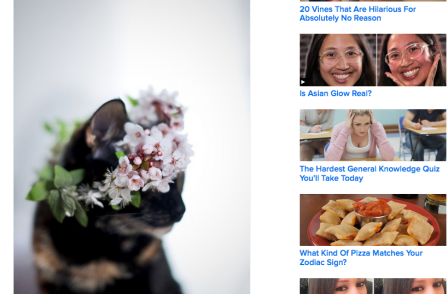
Much-copied website Buzzfeed may well be the future of journalism (or at least one future).
In the UK, while many established news organisations are shedding staff it is rapidly expanding, with 40 editorial staff at last count.
But how much of it is traditional journalism?
Press Gazette looked at every article published by Buzzfeed over a 24-hour period (as put out on the site's main RSS feed).
In the 24-hour period form 12pm on 15 April our analysis found that of 169 articles:
- 59 per cent were entertainment/lifestyle content (eg.'This Is The Most Beautiful Cat On Tumblr')
- 22 per cent were primarily humour (eg. "14 Facts That Show How Misunderstood Sharks Are")
- 19 per cent were, broadly-speaking, news (eg. "Woman Attacks President Of European Central Bank With Confetti, Thoroughly Enjoys It")
The 32 Buzzfeed articles Press Gazette categorised as "news" also included coverage of a study that showed women make up at the most 35 per cent of commenters on news services in the UK, US and Australia.
And there was a long feature on European competition authorities are targeting Google, comparing it to how Microsoft was treated during the company’s 1990s dominance.
Although the article about a woman throwing confetti at Mario Draghi, the president of the European Central Bank, sounds quite flippant – it also highlighted a serious issue.
But dominating this serious content, as you can see in the graph, are entertainment and humour articles of a decidedly lighter nature.
Some of these are not much different from the sort of coverage you might find in a national broadsheet.
For example, this article about how “gorgeous” Denmark is isn’t so far away from the regular travel writing of a Sunday supplement.
And some of Buzzfeed’s apparently frivolous articles tackle serious issues like sexism in a jaunty and accessible way.
Buzzfeed's favourite story formats (from this 24-hour period) appear to be listicles and quizzes.
This example is fairly typical of the latter: "Which Smartypants Movie Scientist Are You, Really?"
In a 2013 article, BBC technology correspondent Rory Cellan-Jones wrote of Buzzfeed's lighter fare: "If that is the future of journalism, heaven help us all."
Cellan-Jones also said there were signs Buzzfeed was "growing up", and based on this analysis that trend appears to have continued.
The website has covered the election campaign extensively, for example, including an exclusive interview with David Cameron. This political coverage has been, for the most part, as serious as that of the national press.
Deputy editor of Buzzfeed UK Jim Waterson told Press Gazette last month: “In the David Cameron interview we asked him some fun questions in the final couple of minutes, but there’s no point interviewing the Prime Minister and asking him about his 12 favourite cats.”
So while the majority of Buzzfeed's content does not look like traditional journalism. there is perhaps more real news on the site than its detractors realise.
*Headline intended to be in the style of Buzzfeed (ed)
Email pged@pressgazette.co.uk to point out mistakes, provide story tips or send in a letter for publication on our "Letters Page" blog
